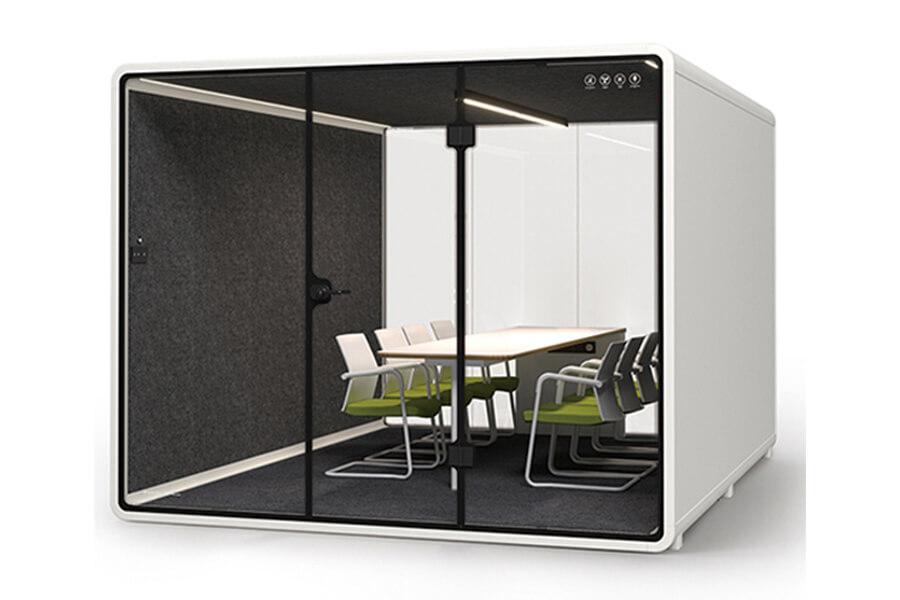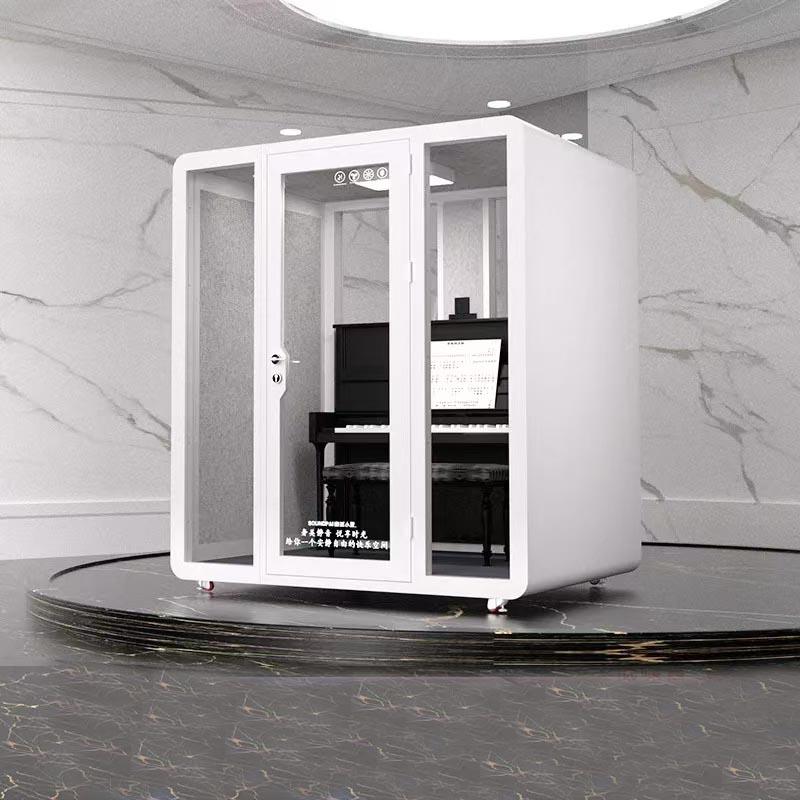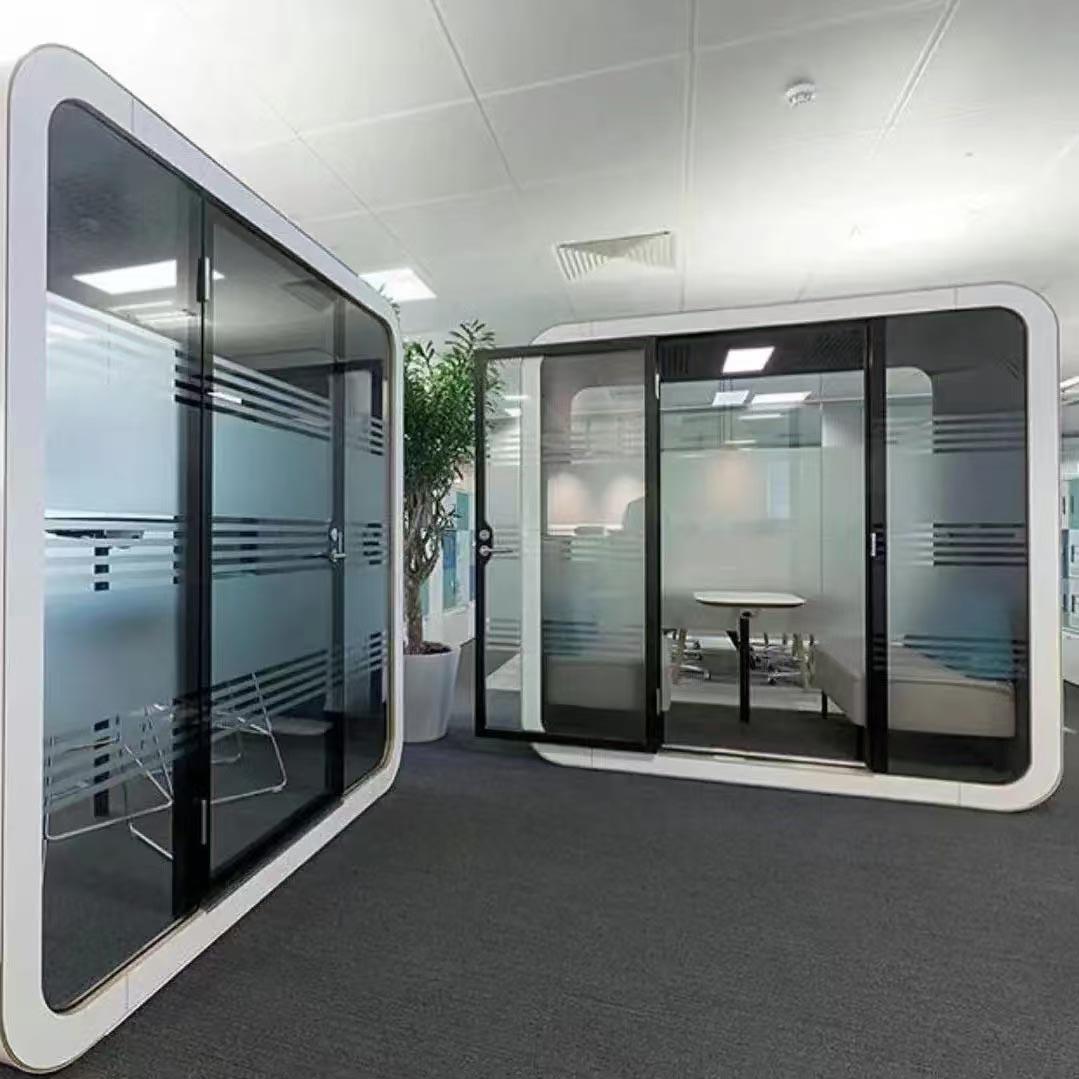Author:SOP Work Pods Manufacturer TIME:2024-12-14
In the modern workplace, the demand for privacy and quiet spaces has led to the rise of individual meeting pods. These compact, soundproof enclosures are designed to provide employees with a peaceful environment where they can hold private discussions, make calls, or focus on work without distractions. Traditionally, businesses have chosen to purchase these pods outright, investing in permanent fixtures for their offices. However, an increasing number of companies are considering the option of renting meeting pods instead of buying them. This article explores the feasibility, benefits, and challenges of renting individual meeting pods, and how this model might reshape office dynamics in the future.
The modern workplace has evolved significantly, with open-plan offices becoming the norm in many companies. While these spaces encourage collaboration and communication, they often lack the privacy and quiet necessary for certain tasks. Employees need spaces where they can focus, make confidential calls, or have sensitive meetings. Individual meeting pods offer a solution to this problem. These pods are designed to be acoustically isolated, providing an environment where individuals can work without disruption. As businesses seek ways to optimize their office space, the question arises: should they buy or rent these pods?
Renting individual meeting pods comes with several advantages for businesses, particularly in terms of flexibility, cost-effectiveness, and scalability. One of the primary benefits is the ability to scale up or down based on the changing needs of the business. For example, during periods of rapid growth, companies may need additional pods, and renting allows them to expand their office infrastructure without a long-term commitment. Similarly, if the company is downsizing, rented pods can be easily returned, eliminating the need for expensive disposal or storage costs.
Another significant benefit of renting is the reduced upfront cost. Purchasing meeting pods can require a substantial initial investment, especially for high-quality, customizable units. Renting, on the other hand, spreads out the cost over time, allowing companies to manage their cash flow more effectively. This option is particularly appealing for startups or businesses with limited budgets who want to provide high-quality workspaces without incurring significant debt.

Many companies that choose to rent individual meeting pods find the added flexibility to be one of the most appealing aspects. Renting allows businesses to test out different pod designs, sizes, and configurations before making a long-term commitment. For instance, a company might initially rent a few basic pods to see how well they integrate into the office space, and later decide to upgrade to more advanced models with additional features, such as built-in video conferencing technology, ergonomic furniture, or enhanced acoustic performance.
This flexibility extends to the duration of the rental agreement. Companies may only need meeting pods for a short-term project or a temporary shift in office layout. Renting provides an option to secure the necessary equipment without locking into a long-term contract. Furthermore, many rental companies offer maintenance services as part of the rental agreement, ensuring that the pods remain in excellent condition throughout the lease period without the company needing to handle repairs or upkeep.
One of the most important factors that businesses consider when deciding whether to rent or purchase individual meeting pods is the overall cost. While renting may appear more affordable on a monthly basis, the long-term costs of renting can add up significantly. For companies that plan to use meeting pods for several years, purchasing may ultimately be more cost-effective than renting. On the other hand, businesses that only need meeting pods for short-term projects or temporary needs may find renting to be the better financial option.
It's important to factor in other hidden costs as well. For example, when purchasing, companies may incur additional expenses such as shipping, installation, and potential customization. Renting, however, typically includes these services as part of the package, making it easier for businesses to budget for the total cost. However, companies should ensure they understand all the terms and conditions of the rental agreement, including any potential hidden fees, to avoid unexpected expenses down the road.
In addition to financial considerations, companies must think about how meeting pods will impact their overall office design. Open-plan offices can be difficult to navigate when adding new structures, and the inclusion of permanent fixtures like purchased meeting pods can disrupt the flow of the space. Renting allows companies to experiment with the layout of their office without committing to a fixed design. If the company finds that the pods are not being used as frequently as expected, they can return them without the hassle of having to permanently reconfigure their office layout.
Moreover, the flexibility of renting meeting pods can help companies maintain a more dynamic and adaptable office environment. If the needs of the company change, rented pods can be easily reconfigured or relocated within the office space to better suit the current requirements. This flexibility is especially important in industries where the nature of the work or the team size may change rapidly.

While renting individual meeting pods offers many advantages, it also comes with some potential drawbacks. One of the main concerns is the lack of long-term investment. When a company rents a pod, they are essentially paying for a service without building any equity or ownership. This can be a disadvantage for businesses that plan to use the pods for many years, as renting may result in higher costs over time compared to purchasing.
Another potential downside is the limited customization options available with rented pods. While some rental companies may offer customization, it is generally more limited than what is available when purchasing. Companies that have very specific needs in terms of design, color, or additional features may find that rental pods do not meet their exact specifications. Additionally, rented pods may not always be available in the quantities or configurations that a company requires, particularly if the demand for such products is high.
The future of individual meeting pods likely lies in a hybrid model that combines both renting and purchasing, depending on the specific needs of the company. As more businesses embrace flexible office designs and remote work models, the demand for temporary, adaptable spaces is expected to increase. Renting individual meeting pods could be the ideal solution for companies that need short-term, scalable office solutions that are easily reconfigurable as their needs evolve.
At the same time, businesses that require long-term, consistent use of meeting pods may still find purchasing to be the most cost-effective option. With the ongoing development of more advanced pod designs, companies may also opt for a mix of purchased pods for permanent installations and rented pods for temporary needs, such as special projects or events. Ultimately, the decision to rent or buy will depend on the company’s size, goals, budget, and office requirements.

The decision to rent or purchase individual meeting pods depends on a variety of factors, including the company’s financial situation, the nature of its office environment, and how long it anticipates needing the pods. Renting offers flexibility, scalability, and reduced upfront costs, making it an attractive option for businesses that need short-term solutions or are unsure about their long-term office needs. However, for companies that require long-term, customized solutions, purchasing may ultimately be the better option. By carefully evaluating the pros and cons of each approach, businesses can make an informed decision that best suits their needs and goals.